- Home
- Robert Goddard
Panic Room Page 7
Panic Room Read online
Page 7
Dale tried to phone his boss in Plymouth from the driveway of Wortalleth West, but the lack of a signal frustrated him. Eventually, he gave up and drove into Mullion, where he pulled into the car park opposite the church and tried again.
He paid no attention to the dusty black 4WD that pulled into a nearby bay, just as he had given no thought to its reflection in his rear-view mirror as he drove into the village.
French and Zlenko climbed out of the 4WD and approached Dale’s van with no sign of haste. But what happened next unfolded, from Dale’s point of view, with bewildering speed. French pressed a button on the jammer in his pocket, cutting off the phone call. Zlenko opened the driver’s door and pulled the key out of the ignition as French opened the passenger door and hopped in beside Dale.
‘Hi,’ he said. ‘Got time for a little conversazione?’
Dale’s mouth opened. But no words emerged.
French smiled. ‘I’ll take that as a yes.’
Don retreated to the empty rear bar of the Blue Anchor, where he tried not to hurry his pint of IPA while contemplating the period bric-a-brac and the wisdom of ordering a pasty, the only food that appeared to be on offer.
Thoughts of food were banished, however, by an overheard remark from the front bar. ‘What’ll you have, Wynsum?’
Wynsum was an unusual name. Don doubted there were two of them in town. He craned up from his seat to see what she looked like.
Wynsum Fry, for Don did not doubt it was her, was a short, barrel-shaped, red-faced woman with close-cropped grey hair. She had small, darting eyes, an oddly childlike button nose and a thin-lipped, crooked mouth. She was not smiling as she paid for her half of still cider. Nor looking at the barman as she handed him the money. Her eyes met Don’s directly. And in that instant he profoundly wished they had not.
A few moments later, Fry walked into the rear bar. Beneath a loose, shapeless brown coat, she was wearing a red sweater and calf-length grey skirt. Her legs were bare, displaying unsightly varicose veins and mottled skin. On her feet she wore grubby grey trainers. All in all, she should have looked merely old and shabby, but Don was uncomfortably aware of a cold, piercing light gleaming in her blue-green eyes.
‘Do I know ’ee?’ she asked.
‘I don’t think so,’ Don replied, smiling uneasily.
‘You looked at me as if you knowed me.’
‘Sorry. A mistake.’ Yes, he thought. It was definitely a mistake.
‘Wynsum Fry.’ She plonked her cider down on the table he was sitting at and offered him her hand, on which the joints stood proud.
A moment passed. Her hand remained extended. Eventually, feeling shamed into it, Don reached out and shook it. Fry’s other hand closed over his as he did so. The sensation was oddly and disturbingly intimate.
‘Sure you don’t know me?’
‘I really—’
‘Only I’m not a good person to lie to.’ She smiled. ‘Not good by a long stretch.’ Then, at last, she released Don’s hand.
‘I’m quite sure we’ve never met.’
‘Ah, well, meetin’ and knowin’ are two different things.’ She sat down opposite him and took a gulp of cider. ‘What’s your name, then?’
‘Does it matter?’
‘Might do.’
‘More likely not. I’m just passing through.’
‘You’m not from these parts. I can see that. Down from Lon’on, is it?’
‘Er, yes.’
‘What line o’ business? No, don’t tell me. I’ll guess.’ She gazed at him with theatrical thoughtfulness. ‘’State agent.’
She was playing a game and enjoying it. Don knew that. The problem, short of standing up and walking out, was how to avoid being drawn into playing it as well. ‘You must’ve seen me come out of Pawley’s offices.’
‘Oh, you bin in there. That settles it, then. Question is, what’s a Lon’on ’state agent doin’ down ’ere? Not many ’ouses in ’Elston likely to interest your clients. We’m all poor as church mice, Mr, er … What’d you say your name was?’
‘I didn’t.’
‘Secret, is it?’
‘No.’
‘You’ll feel better when you tell me.’
Don greatly doubted that. But further refusal only seemed likely to provoke the woman. ‘Challenor,’ he said neutrally.
‘There. Not so ’ard, was it?’ Her yellow-toothed smile was not a cheering sight. ‘You’ll be down ’bout some big, posh place. Out at the coast, like as not. Want me to guess which one?’
‘Not particularly.’ Don knew she would anyway. And he felt he also knew she would guess correctly.
‘Wortalleth West.’
‘Well, I can’t confirm that … Miss Fry. Client confidentiality. I’m sure you understand.’
‘Oh, I understands right ’nough. You’m not to worry on that score, Mr Challenor.’ She took another swallow of cider. ‘Like our ale, do ’ee?’
‘It’s very good.’ He drank some.
‘When’d you come down ’ere, then?’
‘Yesterday.’ Suddenly it felt to Don as if he had arrived much longer ago.
‘Seems much longer ago, I bet.’
He drank some more beer. ‘No. It seems just as long as it is.’
She cocked her head as she looked at him. ‘Not gone ’cording to plan, ’as it? Like you’ve stepped into clear water and invisible tendrils ’ave wrapped theirselves round your feet.’
‘I don’t know what you’re talking about.’ But he did, of course. He knew exactly.
‘I could ’elp ’ee.’
‘I doubt it.’
‘Everyone doubts. Till they see what I do.’
‘And what precisely is that?’ He tried to stare her down, in which he soon realized he could not hope to succeed.
From an inside pocket of her coat she took a pack of cards, held together with a pair of rubber bands, one black, one red. She snapped the bands off, looped them round her wrist and laid the pack on the table. ‘I’ll scry the cards for ’ee. Shuffle, split and deal out twelve. People pay me to do this. I’ll give it ’ee for free.’
‘No thanks.’
‘You’m turning me down?’ She manufactured an expression of childlike disappointment.
‘Sorry. I don’t believe in this kind of …’
‘Mumbo-jumbo?’
‘If you like.’
‘Cartomancy. That’s the dictionary def’nition.’
‘I still don’t believe in it.’
‘Sure?’
‘Yes.’ He engaged her eye to eye. ‘I’m sure.’
She smiled at him and closed her thumb and forefinger round the pack of cards. ‘Last chance.’
‘I’ll pass, thanks.’
‘Your loss.’
‘I’ll risk it.’
‘Please yourself.’ She picked up the cards, adroitly wound the rubber bands round them and slipped the pack back in her pocket.
‘I must be going.’ Don drained his glass and rose from his chair. There could be no question of ordering a pasty now. All he wanted was to be out of the pub and away from Wynsum Fry.
She gazed intently up at him. ‘You go careful, Mr Challenor. I reckon you need to.’
Don left telling himself not to be taken in by anything the old witch had said. But her parting words stayed with him as he reached the brightness of the street. And the sunlight did not dispel them.
I couldn’t settle to anything after Dale left. I kept thinking about the panic room. I kept wondering what I might be in the middle of. Wortalleth West seems a different place now: watchful, secretive, ominous. Like something’s just waiting to happen – something bad. Maybe I really should leave. I promised myself I’d never run from anything again when I left Birmingham. I don’t like running. But …
When Glenys says she’s off, I ask if she’s going via Helston. I claim I need a few things from Sainsbury’s. She says she’s going home, but doesn’t mind a detour to drop me off. I can take the bus back.
<
br /> It’s an excuse, of course. The panic room has spooked me. I just want to be away from the house for a while. I think Glenys senses that, though she says nothing. She doesn’t ask anything about Dale’s visit and I don’t tell her anything either. She’s shrewd enough to know I’ll talk if I want to and not if I don’t. I can imagine confiding in her about a lot of things when I’m ready. And I may be readier sooner than I thought.
I climb into her pick-up and off we go, the quick way to the main road, through Mullion. She smokes one of her roll-ups. It smells more of nettles than tobacco. She doesn’t talk. But the silence between us is almost comforting.
We meet the tail end of some crawling traffic near the winding stretch through Bonython Plantation. At the second bend, we see the reason. A van’s gone off into the hedge. It’s up at an angle in a deep ditch by an overgrown wall. There’s a police car there, blocking our side of the road.
Glenys pitches her dog-end out of the window and breaks her silence. ‘Looks like someone was going too fast,’ she says with a sigh. ‘Hold on, though.’
We both see it at the same time. The name and telephone number on the side of the van. It’s the one Dale was driving.
Impulsively, I get out. Glenys doesn’t have to slow. We’re stopped dead now. I jog down to the police car. There are two policemen, one directing the traffic, the other peering at the van and talking into his radio.
The front of the van’s a serious mess, with crumpled metalwork and a smashed windscreen. Broken glass crunches under my feet as I approach.
The policeman looks round at me and breaks off from his radio conversation. ‘Watch out, my luvver,’ he says. ‘You shouldn’t be here.’
‘Sorry,’ I say, treating him to my most winning smile. ‘It’s just … I think I might know the driver. His name’s Dale.’
‘Could be. In no state to identify himself, I’m afraid, when the ambulance took him away.’ The policeman grimaces. He regrets what he’s just said. ‘It might not be as bad as it looked,’ he goes on, doing his best to sugar the pill. ‘You’ll need to speak to the hospital. They’ve taken him to Treliske.’
‘Right. OK. How did it … I mean …’
‘Looks like he was just going way too fast.’ He shakes his head. ‘God knows why.’
Don’s nerves settled slowly while he sat in the MG in the town centre car park in Helston, munching a supermarket sandwich and sipping a Coke. He was unsure why he had managed the encounter with Wynsum Fry so badly. Meeting her had to have been a coincidence, but he was unable to convince himself of that and could not deny she had got under his skin with considerable ease.
By the time he had finished the sandwich and crushed the empty Coke tin, his watch told him he should set off for his appointment with Pawley. ‘Pull yourself together, man,’ he said to himself as he climbed out of the car.
‘Young’ Mr Pawley, a spruce, sandy-haired fellow no more than a few years younger than Don, greeted him with surprising warmth and led him to his inner office, where a large Ordnance Survey map of the Lizard peninsula hung behind a desk, with pins stuck in it which Don took to represent properties Pawley’s were marketing.
‘Lovely day,’ remarked Pawley, after Don had accepted an offer of coffee. ‘How can I help?’
‘I’m down here to value a house near Mullion,’ Don explained, with an attempt at casualness. ‘I’m working freelance at the moment and it’s possible the agent the vendor appoints will want a co-agency arrangement with someone local.’
‘You couldn’t do better than us. What is the property?’
‘Wortalleth West. Overlooking Poldhu Cove.’
‘I know it. Extraordinary place. I should imagine London – even international – interest is quite likely.’
‘I agree. But we shouldn’t neglect the Cornish angle either.’
‘And you thought of us. I’m flattered.’
The coffee arrived. The first few sips coursed revivingly through Don’s system. ‘D’you know when Wortalleth West was built, Mr Pawley?’
‘Turn of the millennium, as I recall. And, please, it’s Robin.’
‘Who was the builder?’
Pawley furrowed his brow. ‘Not local. An up-country firm. From London, probably.’ He snapped his fingers. ‘No. That’s right. There was comment on it at the time. Well, complaints really. They didn’t hire any local tradesmen. And the firm wasn’t even British.’
‘Not British?’
‘German, I think. Well, you can imagine the resentment that caused. But … why d’you ask?’
‘I’m having difficulty drawing up a complete specification. There are one or two … structural ambiguities.’
‘Oh yes?’ Pawley’s curiosity was clearly aroused. ‘That sounds intriguing.’
‘Look, Robin, I’d be very grateful for any advice you can give me at this stage. How could I find out the original construction details?’ They held the key to the mystery, Don felt sure. He could not persuade himself to leave the matter alone. If Fran wanted the job done, he would do it – his way.
‘The council, perhaps. They must’ve been supplied with them as part of the planning application. But that’s nearly twenty years ago, so whether they’re still on file …’ Pawley leant back in his chair, with his hands behind his head. ‘One thing. The vendor. Would he be Jack Harkness? Only—’
‘No, no. His wife – soon to be ex-wife – owns the property outright.’
‘Does she indeed? That’s interesting.’
‘She’s free to sell. And wants to do so as soon as possible.’
‘In that case, do these … structural ambiguities … really matter? Any buyer would have the place surveyed. And if they didn’t … caveat emptor.’
‘I like to be thorough.’
‘Admirable, I’m sure.’ Pawley looked at Don as if it was also not entirely credible. Thoroughness was probably not something he associated with London agents. ‘I’d be happy to delve into the particulars if we became contractually involved.’
‘I’d hoped you’d say that. But I’m not sure I can just let the situation hang until you’re officially on board.’
‘Understood. I wouldn’t encourage you to try your luck with the Planning Department on a Friday afternoon, though. I suppose …’ Pawley stroked his chin thoughtfully. Don could see the co-agency potential of a multi-million-pound property gleaming in his eyes. ‘I have a few contacts there. If you leave it with me, I’ll see what I can find out. Not likely to have anything for you before early next week, I’m afraid, but …’
Don smiled gratefully. ‘Anything you can dig up would be much appreciated.’
‘Of course.’ Further thoughtful chin-stroking suggested Pawley might yet have more to reveal. Don waited patiently. Then it came. ‘The planning officer who’d have signed off on a project of that scale would have been Maurice Dyer. It’s a pity he’s retired. Otherwise …’
‘But he lives locally?’
‘No. Spain, I believe. And it’s a long time ago, anyway. Fifteen years or more. Pleasant fellow, Maurice. Very accommodating. Someone told me he’d come into money. He certainly didn’t wait to reach pension age.’ Pawley smiled ruefully. ‘Not like the rest of us will have to, eh?’
‘No.’ Don smiled back at him. So, Maurice Dyer, prematurely retired local government officer, had swanned off to Spain with money in his pocket. An inheritance – or a pay-off for a blind eye turned? Don knew which he would have laid his own money on. ‘Not like the rest of us at all,’ he concluded with a sigh.
Don checked his phone while walking back to the car park. A message had come in while he was talking to Pawley. It was from Fran.
‘A progress report would be nice, Don. Are we still on track for Monday delivery of photos and particulars? You should’ve had a visit from a company that’s the nearest I could find to a local expert on panic rooms. Home Security Electronics of Plymouth. And I need assurances that the cleaner’s moving out. Bring me up to speed, please.’
&nbs
p; Don was about to call Fran back, but something stopped him. There was nothing about the situation he was in that he liked. He suspected Harkness had gone to some lengths to conceal the design details for Wortalleth West. French and Zlenko posed a real threat. And he was still disquieted by his encounter with Wynsum Fry.
As he drove out of the car park and headed for the main road, a tempting thought came into his mind. Why not just drive straight back to London and do his best to forget everything that had happened? He could compile an illustrated report on the house over the weekend, deliver it to Fran on Monday, claim his two and a half thousand pounds and wash his hands of the whole thing.
He reached the traffic lights at the junction with the main road and joined the lane to turn left, towards Redruth, the A30 – and London. He thought of Blake and how vulnerable she was, how unaware of the danger she might be in. He thought, fleetingly, of the whole passage of his life to that point. He was not to blame. He was not responsible. He was not involved.
The lights turned green. He moved forward, then suddenly switched indicators and swerved into the lane for turning right, towards Culdrose and the Lizard, towards Wortalleth West – and Blake. An aggrieved driver blared his horn and Don raised an apologetic hand. Soon, he was on the main road, heading south.
I tell Glenys about Don’s discovery of the panic room – and what Dale said about it – as we drive away from the scene of the crash towards Helston. The idea that she doesn’t need to know what’s going on seems stupid now, somehow. I know an accident’s an accident and I shouldn’t make too much of it, but it’s only added to the doubts nagging away at me. Twenty-four hours ago, life was simple. Now I feel like I’ve walked into a quagmire and I can’t find a way out.
Glenys doesn’t say anything for quite a while after I finish. She lights another of her roll-ups and scans the road ahead as if she’s concentrating on the traffic, which has actually thinned a lot since we cleared the spot where Dale went into the hedge. I don’t try to prompt her to speak. I know better than that. She isn’t someone you can hurry.
As we approach the roundabout near Culdrose, she says, through a cloud of cigarette smoke, ‘You should clear out of Wortalleth West, Blake. You truly should.’

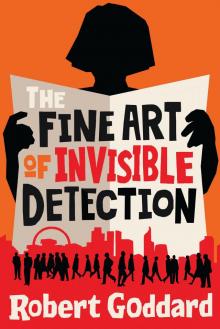 The Fine Art of Invisible Detection
The Fine Art of Invisible Detection One False Move
One False Move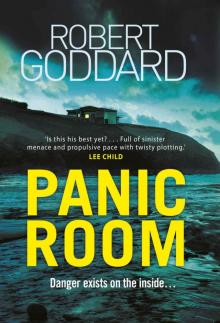 Panic Room
Panic Room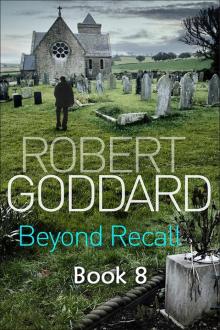 Beyond Recall
Beyond Recall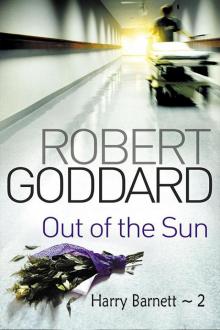 Out of the Sun
Out of the Sun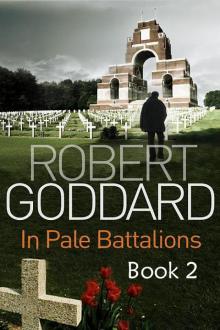 In Pale Battalions - Retail
In Pale Battalions - Retail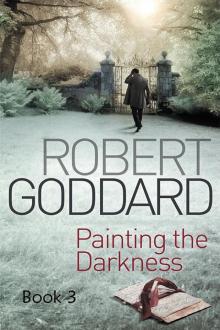 Painting The Darkness - Retail
Painting The Darkness - Retail The Corners of the Globe
The Corners of the Globe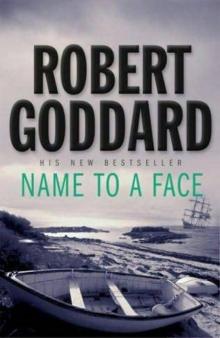 Name To a Face
Name To a Face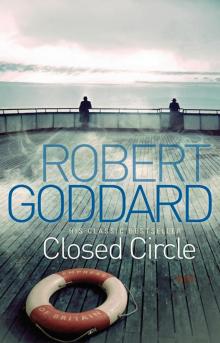 Closed Circle
Closed Circle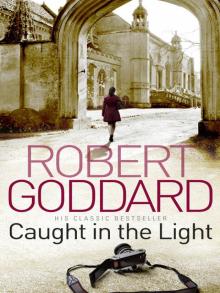 Caught In the Light
Caught In the Light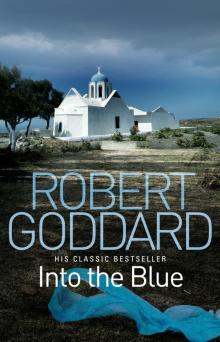 Into the Blue
Into the Blue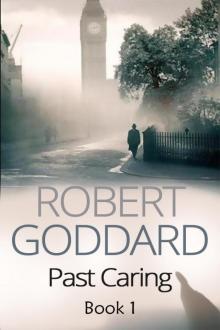 Past Caring - Retail
Past Caring - Retail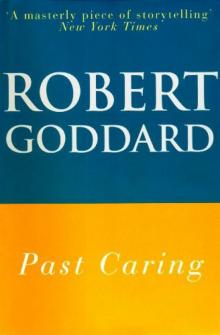 Past Caring
Past Caring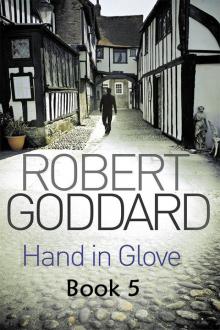 Hand In Glove - Retail
Hand In Glove - Retail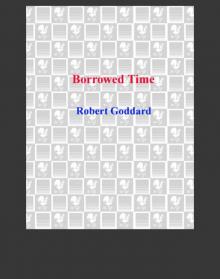 Borrowed Time
Borrowed Time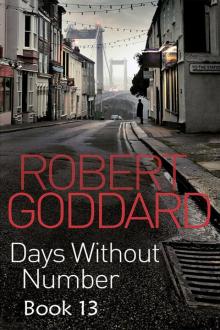 Days Without Number
Days Without Number James Maxted 03 The Ends of the Earth
James Maxted 03 The Ends of the Earth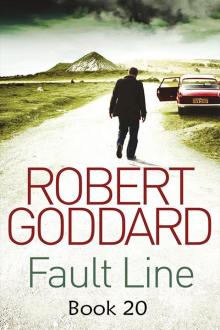 Fault Line - Retail
Fault Line - Retail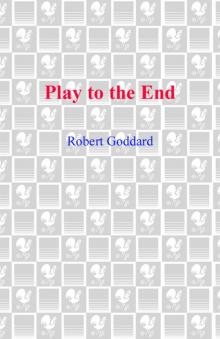 Play to the End
Play to the End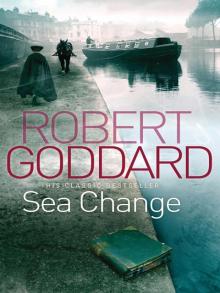 Sea Change
Sea Change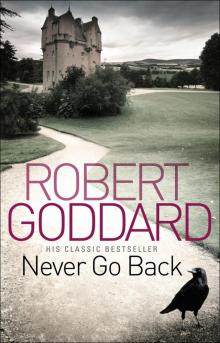 Never Go Back
Never Go Back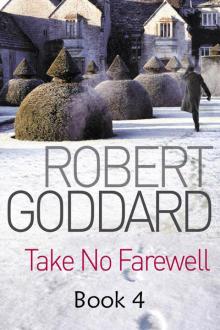 Take No Farewell - Retail
Take No Farewell - Retail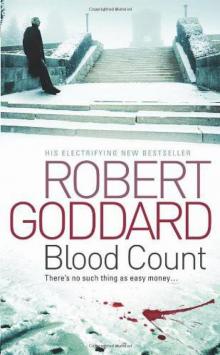 Blood Count
Blood Count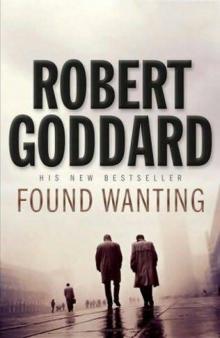 Found Wanting
Found Wanting Sight Unseen
Sight Unseen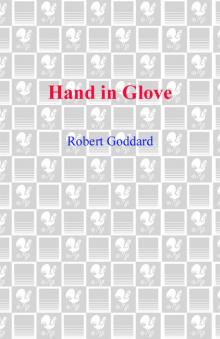 Hand in Glove
Hand in Glove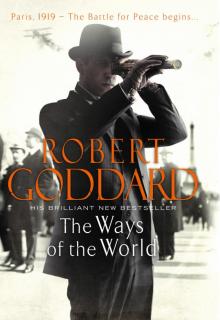 The Ways of the World
The Ways of the World